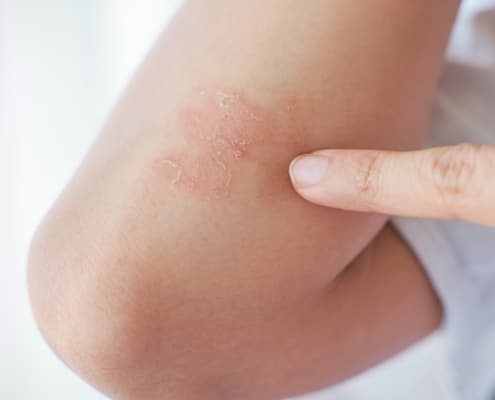Psoriasis: Better nutrition, better skin!
Can a healthy diet improve the symptoms of psoriasis? There is a lot to be said for this. Among other things, a lot of vegetables and little meat dampen inflammatory processes in the body.
Psoriasis, also known as psoriasis, is a chronic skin disease. In pronounced form, it can be very stressful: Typical are scaly, reddened areas of skin that often itch and burn – and which can gnaw at self-confidence and often make people shy away.
The hypothesis has long been that diet could have a decisive influence on the severity of psoriasis. This has now been verified by researchers at King’s College London.
Quadruple risk of severe courses
The result: Patients who ate a particularly unhealthy diet had almost four times as high a risk of severe psoriasis as those affected who ate a healthy diet.
For the study, the team interviewed 257 psoriasis patients in detail about their diet. Based on a standardized questionnaire, the participants also provided information on the severity of their symptoms.
To classify the quality of the diet, the researchers were guided by various proven nutritional concepts. These included the “Healthy Plant-based Diet” and the “Dietary Approaches to Stop Hypertension”, or “DASH” for short. The latter was originally developed to reduce high blood pressure.
Lots of vegetables, little sugar and salt
What both diets have in common is that vegetables, fruit and whole grain products play a central role. Salt and sugar are reduced in both.
The plant-based diet places an additional focus on nuts and unsaturated fatty acids. As part of the DASH concept, more animal products are served on the table, such as lean dairy products and lean meats.
The result: Participants whose diet strongly matched one of the two dietary concepts reported severe psoriasis symptoms significantly less often.
Anti-inflammatories from the garden
Overall, the consumption of fruits, nuts and legumes in particular seemed to be associated with milder psoriasis. This could be related to the anti-inflammatory properties of many plant-based foods, the authors write. The effect of various ingredients such as (poly-)phenols, micronutrients and fatty acids seems to be decisive.
In addition, indigestible fiber could have a beneficial influence. They are processed by microorganisms in the intestine. Among other things, they produce fatty acids that have a positive effect on the immune system.
Meat intensifies inflammatory processes
Conversely, it was noticeable that the consumption of red and highly processed meat in particular was more often associated with severe psoriasis courses.
When red meat is prepared at high temperatures, sugars bind to the proteins and fats it contains – a mechanism known as glycation. If larger amounts of such compounds accumulate in the skin, this promotes inflammatory activity – which could worsen psoriasis symptoms.
Another factor is trimethylamine-N-oxide, which is produced in the intestine during the breakdown of food of animal origin. Previous studies have also found a connection with the severity of psoriasis symptoms for this substance.
BMI also plays a role
The type of diet also affects the body mass index (BMI) – and this also apparently influences disease activity in psoriasis. In fact, it could be an important link in the context of diet and disease severity: Excess fatty tissue activates the release of inflammatory messengers that could worsen psoriasis.
Nutritional counselling could play an important role in psoriasis therapy as an adjunct to standard treatment, believes Sylvia Zanesco, the lead author of the study.
“Next, we want to conduct a controlled clinical trial to investigate whether diets rich in healthy plant-based foods can alleviate the symptoms of psoriasis.”
In the UAE
Psoriasis is a chronic autoimmune skin condition characterized by red, scaly patches that can cause discomfort and impact quality of life. While there’s no definitive cure, various treatments are available in the UAE to manage and alleviate symptoms effectively.

